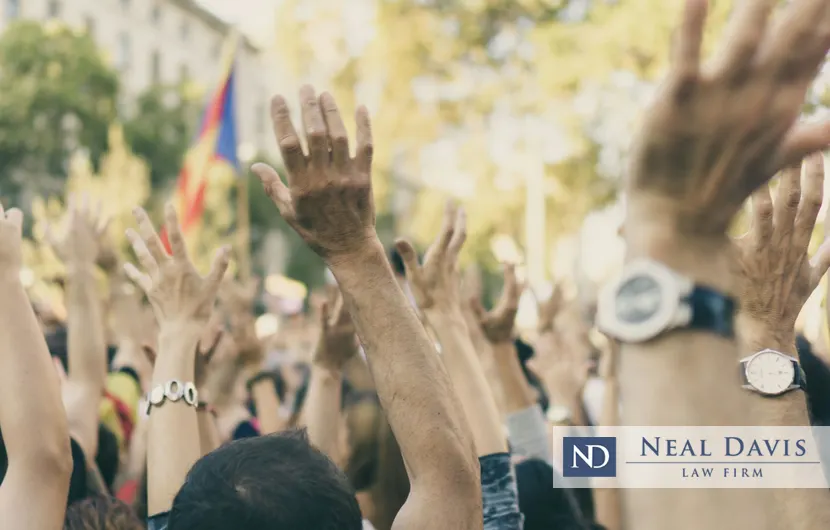What constitutional rights do criminal defendants have? How are these rights incorporated on state and federal level? Let experienced Houston criminal defense lawyer Neal Davis represent you.
If you or a loved one have been charged with a crime, you are now considered a criminal defendant – regardless of your innocence or guilt.
Now, more than ever, it’s important for you to know that the United States Constitution grants all people with certain rights under the Bill of Rights and several amendments. Individuals are provided these basic protections while moving through the criminal justice process and any breach of these rights may result in a mistrial or dismissal of your case.
First and foremost, the prosecution must prove beyond a reasonable doubt that the defendant is guilty of the offense they’ve been charged with in order to convict and sentence the individual for a crime.
Continue reading to learn about what Constitutional rights defendants have in Texas,
or let experienced Houston criminal defense attorney Neal Davis today explain your rights and fight to ensure you receive a fair trial.
Schedule an AppointmentWhat are the constitutional rights of a criminal defendant in Texas?
Under federal law and rulings in historic cases, the United States Supreme Court has granted criminal defendants a number of fundamental rights. Some of these rights are read to a person upon being arrested. These are known as the Miranda Rights and the arresting officer must inform the individual of the following:
- You have the right to remain silent.
- Any statement you make can and will be used against you in court.
- You have the right to have an attorney present.
- If you cannot afford an attorney one will be provided.
These and other criminal defense rights of Texans and all Americans are detailed in the fourth, fifth, sixth and eighth amendments of the U.S. Constitution:
4th Amendment rights
Right to probable cause for searches & seizures. If law enforcement or the prosecution obtains evidence against you illegally, then that evidence will not be admissible in court.
The Constitution requires probable cause to be established before searches and seizures, and defendants can dispute the charge if they believe a search and seizure was unreasonable.

5th Amendment rights
- Right to remain silent. The Fifth Amendment protects defendants from self-incrimination by establishing their right to stay silent when questioned by police during arrest or by a prosecutor during trial. According to the Constitution, a defendant cannot “be compelled in any criminal case to be a witness against himself.” This is what people mean when they “plead the fifth.”
- Right against double jeopardy. A defendant also cannot be tried for the same crime twice according to the Fifth Amendment. This is called “double jeopardy,” and it’s unconstitutional. For example, if a defendant is charged with sexual assault and the case is dismissed, the state cannot retry the person with the same offense in the hopes of a different outcome.
6th Amendment rights
- Right to representation. Every criminal defendant has the right to adequate representation from an attorney and professional legal counsel. The government will provide a lawyer if you cannot afford to hire one. The defendant also has the right to decline legal representation and represent himself or herself, though this is not recommended.
- Right to a speedy trial. Defendants have a right to quick and speedy trial so that they aren’t sitting in jail for months waiting for their day in court. Defendants can also choose to waive their right to a speedy trial if desired. This can happen in cases where the defense needs more time to build their case. Unfortunately, neither the federal constitution nor Texas state constitution specify what length of time is considered “speedy,” making violations to this right difficult to determine without help from a knowledgeable attorney.
Important note:
Just because you are guaranteed adequate representation doesn’t mean the legal counsel assigned to your case is perfect. Court appointed attorneys often have heavy caseloads and are more likely to make a mistake. You’ll need to hire an experienced criminal defense attorney to secure the best possible outcome in your case.
- Right to a public jury trial. The Sixth Amendment also grants defendant’s the right to due process under the law via a public trial by jury. Jury members are selected from the community at random and must be proven to be impartial. Both the prosecution and defense take part in jury selection.
- Right to confront witnesses. Under the Constitution, criminal defendants have the right to confront or cross-examine witnesses who testify against them in order to dispute their testimony and question the witness’ reliability. In most cases, witnesses must “look the defendant in the eye” so that the defendant can confront the witness in person. The defendant also has a right to call supporting witnesses to testify on their behalf.
8th Amendment rights
- Right to a reasonable bail. Bail allows defendants to leave jail while they await trial by paying a fee to ensure they return on their court date. Bail is not granted in all cases, but if it is then the court has a duty to set a bail amount that’s reasonable considering the severity of the offense and the defendant’s likelihood of fleeing. For example, bail should not be set high for a person without a criminal record who has been charged with a minor offense or misdemeanor. (To learn more, read our Criminal Defense Guide to Bail & Bonds.)
- Right to be free from cruel and unusual punishment. Lastly, defendants are protected under the Eighth Amendment from “cruel and unusual punishment” if convicted of a crime. This means individuals are guaranteed certain rights such as access to basic medical treatment in prison and protected from disproportionately harsh punishments or fines that don’t fit the crime. For instance, a person convicted of a minor drug possession offense should not be sentenced to life in prison or the death penalty.
Other rights granted to criminal defendants include the right to be told what offense you are being charged with, to appeal to a higher court if convicted and to go before a grand jury in federal felony cases.
“Neal’s team was amazing. Not only did they take the time and listen to my every fear, they gave me the comfort and reassurance I needed as well as put up with my constant emails every time the fear struck again. I was never ignored, and I never had to call more than once for answers or advice. Truly compassionate attorneys here! They grabbed my case by the head and I have no doubt their proactive actions saved me. If you are in need of a criminal attorney, you have definitely come to the right place!”
Houston | Client’s federal charges declined
Verified customer
When should I hire a criminal defense attorney to protect my rights?
Simply put, as soon as possible. Criminal proceedings are very complex. If you or a loved one have been charged with a crime in Texas, contact Houston criminal defense attorney Neal Davis immediately. Neal has spent over 25 years skillfully defending the constitutional rights of his clients by fighting for a fair trial and the best possible outcome. He has even taken cases before the Texas Criminal Court of Appeals and the U.S. Supreme Court.
Don’t leave your case up to chance. Contact the Neal Davis Law Firm today to discuss your legal rights.






